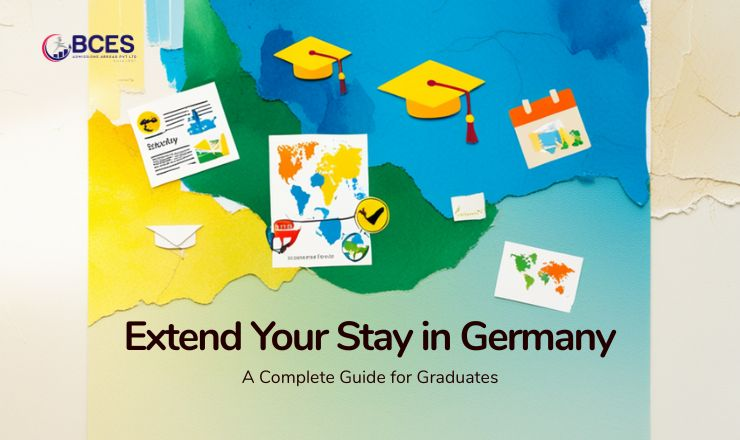Complete Guide for International Students to Extend Their Stay in Germany after Graduation

11 August 2025
Germany is currently a favorite among international students due to its better education system, affordable tuition fees, and strong labor market. For most graduates, though, the hopes are not only to get a degree but also to find a career and make a name for themselves in Germany. After you have finished studying and show your wish to remain in the country, the best news is that Germany has clearly established procedures to extend your residence permit after graduation.
At BCES Admissions Abroad, we understand that visa and permit processes are complicated, especially post-graduation. That is why we have outlined the steps, the requirements, and the recent news to help you plan with ease. If your aspiration is to enter the job market, gain professional experience, or find work in your field, Germany has the path to transform your intellectual investment into a sustainable professional life.
Understanding the Post-Graduation Stay Options
Once you graduate from a German university, you are eligible to apply for an 18-month residence permit to find employment in your field of study. This work permit upon studies is one of the most appealing aspects of the German immigration policy. It gives you the opportunity to remain in the country even without an actual employment offer, providing you with time to find a proper job.
You can get any kind of job in the 18 months to assist in supporting yourself whilst you seek employment that will suit your skills. This provides many graduates with a chance to enter the employment market and gain experience, but possibly initially in some other form of work.
Main Requirements for Renewing Your Residence Permit
To be successful in staying longer after graduation, you need to meet the following requirements:
Recognised Degree – You need to have a degree from a recognised German higher education institution.
Proof of Financial Stability – You must provide evidence that you are financially in a position to take care of yourself while searching for employment, for example, bank statements, a blocked account, or a labor contract.
Valid Health Insurance – Health insurance is mandatory for your entire stay.
Accommodation Confirmation – Provide proof that shows where you will be staying while in Germany.
Application Process – Step by Step Explained
Rush Document Preparation – Collect your passport, degree or academic certificate, health insurance proof, financial documents, and proof of residence arrangements.
Make an appointment – Phone your local Ausländerbehörde (Foreigners’ Office) well in advance, as appointments can take weeks to arrange.
Send Your Application – Send your application with the processing fee, usually between €100 and €150.
Obtain Your Permit – Once issued, you will be given your residence permit for the 18-month period after graduation.
Switching from a visa to work while searching for a job
If you are able to secure employment pertaining to your degree within the 18-month period, you can then shift to a residence permit for work. Depending on the type of employment and the amount of remuneration you receive, you might be eligible for the EU Blue Card, which can speed up the process of becoming a permanent German resident.
Current Update for Graduates
Starting from 2025, Germany streamlined its application process for residence permits and the option to apply online through certain states. The government also relaxed the working hours during the period of job hunting, allowing graduates to work full-time in other industries while looking for work in their own professional fields.
Why This Opportunity Matters
Germany’s strong economy, skill deficiency in most fields, and liberal policies towards skilled immigrants guarantee graduates who stay a very good chance of developing a fruitful career. This is especially valuable for engineers, IT professionals, health professionals, and research scientists.
To get personalized advice on studying, working, and establishing your career overseas, contact BCES Admissions Abroad today at +91 9319996330. We assist students in making the correct choices and taking the correct actions towards their education and career aspirations overseas.
Frequently Asked Questions (FAQs)
You would need to apply prior to your existing student visa or residence permit expiring. You can plan at least two months ahead.
As of 2025, graduates with job-seeking permits shall be allowed to take up full-time jobs in different sectors while continuing to look for suitable job opportunities that match their qualifications.
It is possible to change to a work permit or an EU Blue Card without a waiting period for the completion of the 18-month period.
The 18-month visa is not permanent. If you do not gain a qualifying job position within 18 months, then you will need to look at other visa alternatives.
One may be allowed to move anywhere in Germany in search of jobs, as long as local competent authorities are informed.